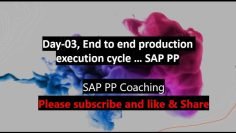The video provides an introduction to SAP HANA, its versions, and its significance in the SAP ecosystem. The instructor emphasizes the importance of understanding HANA’s versions and how to identify them. The video also touches upon the differences between HANA and other databases, as well as the performance advantages of HANA.
Key topics covered in the video session:
- Understanding SAP HANA: SAP HANA is a database, not an application. S/4 HANA, on the other hand, is an application that runs on the HANA database.
- SAP Versions: There are various versions of SAP, with ECC 6.0 being a popular one. Currently, S/4 HANA is gaining prominence. ECC can be installed on HANA, but S/4 HANA is exclusively supported on HANA.
- Discussion on Databases: S/4 HANA does not support databases like Oracle. It primarily supports HANA. There’s a mention of other databases like Sybase, but the emphasis is on HANA’s performance benefits.
- Performance of HANA: HANA is known for its high performance, which is why many companies are adopting it. The instructor gives an example of SpiceJet Airlines, which switched to SAP due to its performance advantages.
- Versions of HANA: HANA has two main versions: 1.0 and 2.0. Within these versions, there are various Service Pack (SP) levels. For instance, HANA 1.0 has SP levels from SP0 to SP12. HANA 2.0 has SP levels like SP0, SP01, and so on.
- Revisions in HANA: Apart from SP levels, HANA also has revisions. These revisions are updates within a specific SP level. For example, HANA 2.0 SP05 can have multiple revisions.
- Checking HANA Version: The instructor guides the viewer on how to check the HANA version in their system. The version can be identified by specific numbers that denote the SP level and revision.
- HANA’s Popularity: The instructor emphasizes that HANA’s popularity is due to its performance. Many companies are now implementing S/4 HANA, and having knowledge of HANA is crucial for professionals in the field.








